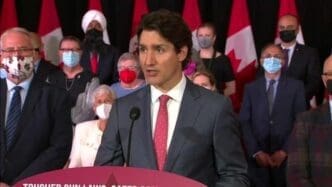In a surprising turn of events, Canadian Prime Minister Justin Trudeau announced his resignation Monday, citing internal discord within his government. His decision follows the abrupt departure of his finance minister, indicating escalating unrest in the leadership.
Trudeau revealed that ongoing “internal battles” contributed to his decision, acknowledging that he “cannot be the best option” for the upcoming election. He intends to remain in his role until the Liberal Party appoints a new leader. Meanwhile, an official source disclosed that Parliament, originally set to resume on January 27, will be suspended until March 24 to accommodate the leadership race.
This political shift comes as Canada faces challenging international dynamics. The Prime Minister had maintained silence despite mounting calls for his resignation. However, his position weakened significantly with the finance minister, Chrystia Freeland, resigning last month. Freeland criticized Trudeau’s economic strategies, especially in light of potential tariffs imposed by U.S. President-elect Donald Trump.
Freeland’s resignation letter highlighted the need for Canada to preserve resources for potential economic conflicts. Her departure, along with that of the housing minister, prompted national concern about Trudeau’s leadership longevity. Historically, no Canadian prime minister has secured four consecutive terms, and with the Liberal Party’s recent electoral setbacks, Trudeau’s political future appeared bleak.
Trudeau’s popularity waned due to various domestic challenges, including inflation in food and housing costs, and debates over immigration policies. His tenure was marked by efforts to balance economic interests with environmental protection, which attracted criticism from both sides of the political spectrum. While Canada managed the COVID-19 crisis relatively well, vaccine mandate dissent contributed to public discontent.
Trudeau, who assumed office in 2015 after a decade of Conservative governance, was initially praised for reviving Canada’s liberal values. He championed causes such as diversity, gender equality, and legalized cannabis. Despite these efforts, his administration was marred by controversies and unpopular policies, leading to a decline in voter support.
As the Liberal Party gears up for a leadership contest, the opposition parties have indicated plans to challenge the government with a no-confidence vote upon Parliament’s return. This political shift is coupled with the pressure from the U.S. regarding immigration and trade issues, placing Canada at a crucial juncture in its political landscape.
Justin Trudeau’s resignation marks the end of an era in Canadian politics. Facing mounting disapproval and an uncertain international climate, his departure opens a new chapter for the Liberal Party and the nation. The upcoming leadership race and potential early elections signal a transformative period as Canada navigates domestic and global challenges.
Source: Wsvn







